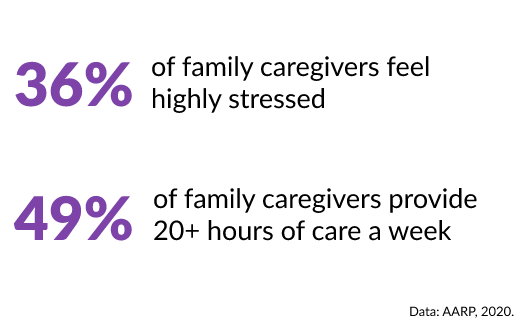Taking care of each other is part of what being a family and community is all about. But caring for a loved one can get stressful at times, especially when providing care and companionship competes with other necessary everyday priorities like work, school, and even the caregiver’s health themselves. When caring takes too much away from the person providing it, caregiving can quickly become caregiver burden.
Many caregivers feel powerless to change the situation, and this can continue to drive burnout. They might feel guilty for not being able to be with their loved one 24/7. But new health sitting platforms like SitByCare are looking to take some weight off their shoulders, and help meet the need of companionship and care with trusted health sitters on-demand.

Care Comes In Many Forms
Traditionally, caregiver burden has been seen in context of the home—think an aging parent who needs constant companionship or a child with a developmental disability. However, people who have extended stays in hospitals, people recovering in long-term care facilities, and people living full-time in retirement communities still require a form of care from their loved ones.
Planning visits, having conversations, playing games, reading books—these are all different ways of showing your person that you care. In our increasingly busy world, it can be difficult to maximize these moments of connection. Not being able to spend all the time you want with your loved one can leave you with feelings of guilt.
Are You Experiencing Caregiver Burnout?
People experience the symptoms of caregiver burnout in their own way, but there are some common patterns that can be used to identify the condition. How many of these do you agree with?
- My everyday job(s) often conflict with my caretaking duties.
- I don’t feel like I have much time to myself.
- I get easily anxious or agitated.
- I feel tired all the time, even when I get sleep.
- My brain often feels foggy.
- I feel like I do so much and it’s never enough.
If you are providing care to someone and agree with more than two of the above statements, you may be experiencing caregiver burnout. Caregiver burnout has a negative impact on both the caregiver and the person receiving the care, so it’s important to get help as soon as possible. Sometimes, help means seeing a therapist. Sometimes, it’s more self-care. Other times help is having the right support system in place, so the weight of the world doesn’t have to fall on you all the time.
How SitByCare Can Help
SitByCare is a new health sitter platform that connects local health sitters to patients and companion seekers.
Through SitByCare, you can get matched on-demand with a trusted and qualified health sitter. Our health sitter provide joyful, non-medical companionship to people in hospitals, long-term care facilities, retirement communities. You can select sitters who share the same interests, speak the same languages, or even experienced the medical condition of your loved one. SitByCare is committed to providing companionship and connection when you can’t be there.
Interested in securing supplemental companionship for a loved one? SitByCare may be right for you. Learn more about the health sitter services offered by SitByCare or sign up to become a sitter yourself.

